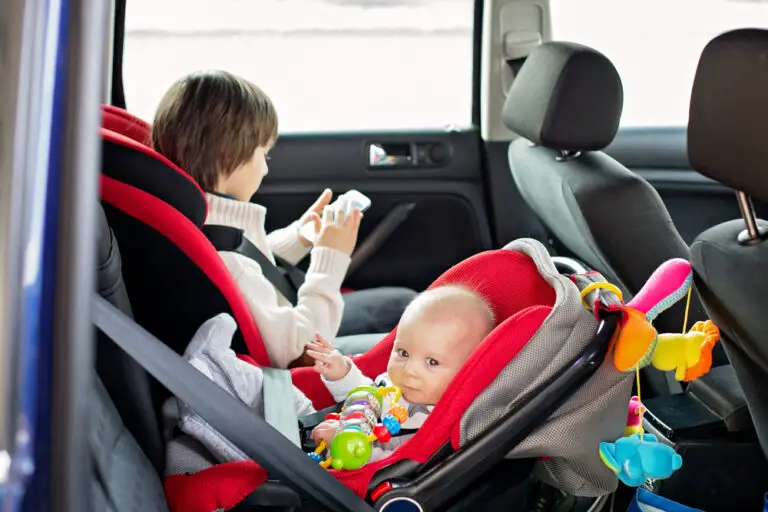Connecticut Car Seat Laws 2024 (Rear, Forward & Booster)

Connecticut car seat laws require a child passenger under 8 years of age to be secured in an appropriate child safety restraint system. These include rear-facing, forward-facing, and booster seats, depending on the child’s age and weight. Violating the law carries a penalty and a charge of class A misdemeanor for repeated violations.
Disclaimer: The content in this article does not, in any manner, constitute legal advice. It is solely for the purpose of providing information. The law is amended from time to time and information in this article may not always be up to date. We recommend you check the original source of the law.
- CT Rear-Facing Seat Law
- CT Forward-Facing Seat Law
- CT Booster Seat Law
- CT Child Front Seat Law
- CT Child Seat Belt Law
- CT Taxi Child Seat Law
- CT Ridesharing Seat Law
- CT Child Seat Repl. Law
- Leaving Child in Car in CT
- Choosing a Child Seat in CT
- Seat Installation Help in CT
Connecticut Car Seat Laws
Connecticut Rear-Facing Car Seat Law
According to the rear-facing car seat law in Connecticut, a child under two years of age or weighing less than 30 pounds must be secured in a rear-facing child seat with a five-point harness. (1) The rear-facing car seat must not be placed in the front seat of a vehicle with a functional passenger-side airbag.
The rear-facing car seat age in Connecticut is 2 years. The State’s Department of Public Health (DPH) also suggests keeping children in an infant rear-facing seat till the age of 2. (2)
A first violation of the Connecticut rear-facing child seat law will constitute an infraction. For a second violation, there is a fine of a maximum $199. A third and subsequent violation carries a charge of a class A misdemeanor.
Age: Newborn to 2 years
Weight: Less than 30 pounds
Penalty: First time: Infraction; second time: maximum $199; third and subsequent violation: class A misdemeanor.
Connecticut Forward-Facing Car Seat Law
According to the forward-facing car seat law in Connecticut, a child between the ages of 2 and 5 years or weighing between 30 to 40 pounds must be placed in a forward-facing car seat. (1) The seat must have a five-point harness and be federally approved.
As per Connecticut’s DPH, children should ride in a rear-facing seat until age 2 or till they reach their upper height or weight limits. The forward-facing car seat age in Connecticut is 2 to 5 years. This is in line with the recommendations of the American Academy of Pediatrics (AAP).
Violating the Connecticut forward-facing child seat law for the first time will constitute an infraction. A second violation will attract a fine of a maximum $199. For a third and subsequent violation, the person will be charged with a class A misdemeanor.
Age: 2 to 5 years
Weight: 30 to 40 pounds
Penalty: First time: Infraction; second time: maximum $199; third and subsequent violation: class A misdemeanor.
Connecticut Booster Seat Law
According to the child booster seat law in Connecticut, a child between the ages of 5 and 8 years or weighing between 40 to 60 pounds must be restrained in a booster seat. (1)
It must be secured by a safety belt. Under the Connecticut booster seat requirements, a child must not be restrained in a booster seat if the vehicle does not have a seat belt that includes a shoulder belt.
The booster seat age in Connecticut is 5 years. But children should switch to a booster seat once they outgrow the upper weight or height limits of their forward-facing seats. They can then move to a high back or backless booster seat.
A first violation of the law constitutes an infraction. A second violation carries a maximum fine of $199. A third and subsequent violation carries a charge of a class A misdemeanor.
Age: 5 to 8 years
Weight: 40 to 60 pounds
Penalty: First time: Infraction; second time: maximum $199; third and subsequent violation: class A misdemeanor.
Connecticut Child Front Seat Law
There is no definite child front seat law in Connecticut. However, the backseat is safer for children. The AAP recommends that children ride in the backseat till they are 13 years old. Even though the front seat age in Connecticut is unclear, it is best to follow AAP recommendations.
If absolutely necessary, a child can ride in the front seat in a forward-facing car seat. The car seat must be appropriate for the child’s height and weight. The vehicle seat must be pushed as far back from the airbag as possible. If you are traveling with a child in a rear-facing seat, the front seat airbag must be deactivated.
You must follow these requirements to ensure the complete safety of your child in the front seat.
Age: 13+ years (recommended)
Connecticut Child Seat Belt Law
According to the child seat belt law in Connecticut, all children 8 years of age or older and under 16 years of age and weighing 60 or more pounds must wear a properly fastened seat belt. (1) It must fit securely whether the child is in the front seat or the backseat.
Connecticut children’s seat belt law doesn’t apply to children who are physically unable to wear an adult safety belt. They need to have a written statement from a licensed physician to that effect.
An authorized emergency vehicle, other than fire fighting apparatus, a rural letter carrier of the US postal service and a vehicle used for delivering newspapers are also exempt from seat belt rules in Connecticut.
Not wearing a seat belt as per the requirements of Connecticut state law carries a fine of $75 for passengers younger than 18 years. For others, it is $50.
Age: 8 to 16 years
Weight: 60+ pounds
Penalty: $75 for passengers younger than 18 years; $50 for others.
Connecticut Taxi Child Seat Law
According to the taxi child seat law in Connecticut, taxis are also required to comply with child seat requirements in Connecticut. Thus, they have to ensure that every child passenger under the age of 8 is properly secured in a federally approved car seat. (1) The car seat must be appropriate for the child’s age and weight as stated in the law.
The person transporting the child has to ensure that the child is properly secured. The law may hold the driver or the parent/caregiver liable.
It is best for the driver to have a taxi child seat in Connecticut that is versatile and federally approved. Before boarding the taxi, the parent/caregiver must check that the car seat is appropriate for their child’s age and weight.
Connecticut Ridesharing Child Seat Law
The ridesharing child seat law in Connecticut is unclear. Car seat laws in Connecticut require children under 8 years of age to be secured in an appropriate child restraint. (1) They do not mention ridesharing services or who should provide the child seat.
A person who transports the child in a motor vehicle is responsible for ensuring that the child is properly secured. In such a scenario, it is ideal for either the driver or the parent/caregiver to provide a car seat. This would include a rear-facing, forward-facing, or booster seat, depending on the age and weight of the child.
The driver or the parent can be held liable for a violation of these Connecticut car seat regulations. Thus, when traveling in a rideshare service such as Uber or Lyft, ensure that the driver has an appropriate car seat or arrange one before boarding with your child.
Connecticut Child Seat Replacement Law
There is no express child seat replacement law in Connecticut. It is best to follow recommendations from the National Highway Traffic Safety Administration (NHTSA). If your vehicle is involved in a moderate or severe accident in Connecticut, you should immediately replace your child safety seat.
There is no urgent need for replacement after a low-impact accident. A crash is said to be a low-impact one when no passenger sustains injuries, the airbags didn’t deploy, there was no damage to the car seat and the vehicle could be driven away from the crash site.
Apart from child seat replacement after an accident, you must also replace the car seat after it has passed its expiry date set by the manufacturer or your child has outgrown it.
Leaving Child in The Car in Connecticut
According to the law on leaving a child in a vehicle in Connecticut, a parent, guardian, or person exercising supervision over a child under 12 years old cannot leave them alone in a vehicle. (3) Knowingly leaving a child in the car in Connecticut is a class A misdemeanor.
Further, leaving a child unattended in a vehicle between 8 pm and 6 am is classified as a class C felony. (3) The parent, guardian, or person exercising supervision over the child younger than 12 years will be held responsible.
It is extremely dangerous to leave a child alone in a vehicle. The most common risk is of a heat stroke as temperatures inside the car can rise rapidly. Other dangers include the child getting kidnapped, setting the car in motion or having an in-car accident.
Choosing a Child Car Seat in Connecticut
When choosing a car seat in Connecticut, you can refer to the pointers given by the State’s DPH. (2) From birth to 2 years, a rear-facing seat is the best car seat to use in Connecticut for babies. Once they outgrow it, they can ride in a forward-facing seat.
Under Connecticut child seat laws, a child aged 5 to 8 years and weighing 40 to 60 pounds should be placed in a booster seat. You can either choose a backless or a high-back booster seat to protect the child’s head. A versatile all-in-one seat may be the best booster seat to use in Connecticut.
Car Seat Installation Help in Connecticut
Child passenger safety seats in Connecticut must be installed correctly. It can be a complex exercise if you have not done it before. You have to follow the car seat as well as your vehicle’s manuals.
Even if you have installed it, you should get it inspected by a certified child passenger safety (CPS) technician. Many fitting stations in Connecticut have certified CPS technicians that can assist you with the installation and inspection of your car seat. Some of the stations are:
- Fairfield Police Department
- Cheshire Police Department
- Hamden Police Department
- Simsbury Police Department
- Wilton Police Department
- New Milford Police Department
- Bethel Police Department
Connecticut Car Seat Safety Resources
- Connecticut State Department of Public Health
- 2-1-1 of Connecticut: It is an online repository of information that connects people to essential health and human services.
- Town of Rocky Hill: The official website of the Town of Rocky Hill, it provides information about car seat laws and tips on car seat safety.
- Willows Pediatric Group: A leading pediatric hospital, it provides comprehensive medical care to infants, children, and adolescents.
- Connecticut Children’s: It is the only health system in Connecticut that is dedicated to children.
- Safe Kids Connecticut: Led by the Connecticut Children’s Medical Center, it works with organizations and individuals to prevent unintentional injuries in children aged 0-19.
FAQ
How long should a child ride in a rear-facing car seat in Connecticut?
A child should ride rear-facing till they are at least 2 years old and weigh less than 30 pounds. The rear-facing seat must be placed in the back.
Can you put a rear-facing car seat in the front seat in Connecticut?
You can put a rear-facing car seat in the front seat only if the passenger-side airbag has been deactivated. Otherwise, it must always be placed in the backseat.
Can you put a rear-facing car seat in the middle rear seat in Connecticut?
You can put a rear-facing car seat in the middle rear seat only if it fits properly. You must go through the car seat as well as your vehicle’s manuals.
When can a baby face forward in a car seat in Connecticut?
A baby can face forward in a car seat after they turn 2 years old and weigh more than 30 pounds or once they outgrow their rear-facing seat.
How old for a booster seat in Connecticut?
A child aged 5 to 8 years and weighing 40 to 60 pounds can use a booster seat. They can also switch to a booster once they outgrow their forward-facing seats.
When to use a backless booster seat in Connecticut?
You can use a backless booster seat if your vehicle seat has a headrest and the child’s ears are not higher than the seat back.
When can a child sit in the front seat in Connecticut?
There is no specific age mentioned in the law. However, the AAP recommends that children sit in the front seat once they turn 13 years old.
When can a child sit in the front seat with a booster in Connecticut?
Children can ride in the front seat in a booster with the seat belt properly secured and the vehicle seat pushed back from the dashboard.
When can a child stop using a booster seat in Connecticut?
A child can stop using a booster once they turn 8 years old or weigh more than 60 pounds. They must also safely fit into the adult seat belt.
When to switch from 5 point harness to a seat belt in Connecticut?
The ideal time is when the child outgrows the 5-point harness in a forward-facing seat. They can then switch to wearing a seatbelt in a booster seat.
When can a child use a regular seat belt in Connecticut?
A child can use a regular seat belt once they are 8 years old or weigh more than 60 pounds. The lap and shoulder belt should fit properly across their collarbone, chest, and hips.
Do you need a car seat in a taxi in Connecticut?
Yes, you need a car seat in a taxi in Connecticut. All children younger than 8 years must be properly secured in an appropriate car seat in a taxi.
Do you need a car seat in a Uber in Connecticut?
The law is unclear. But either the caregiver or the driver should provide a federally approved and appropriate car seat to ensure the child’s safety.
Do you need a car seat in a Lyft in Connecticut?
The law does not say anything. But it is better if the caregiver or driver can provide an appropriate car seat to ensure the child’s safety.

Rishima Rawat
Rishima Rawat is a lawyer and legal writer with over six years of writing and legal experience. She earned her LLB degree from the West Bengal National University of Juridical Sciences, Kolkata. With a passion for child safety, she’s written extensively about the U.S. car seat laws in ParentingMode. She collaborates with businesses and law firms globally, enhancing their online content. Her insights are also published in legal journals like RGNUL, NLIU, and RMLNLU Law Review. Committed to the cause of education, she has volunteered with IDIA, which helps underprivileged children in India to access legal education. She has also worked with Enhelion Knowledge Ventures, a leading legal ed-tech platform in India that provides students with affordable courses in law. Fluent in English and Hindi with elementary proficiency in Spanish, Rishima combines her legal expertise with a dedication to child safety.






